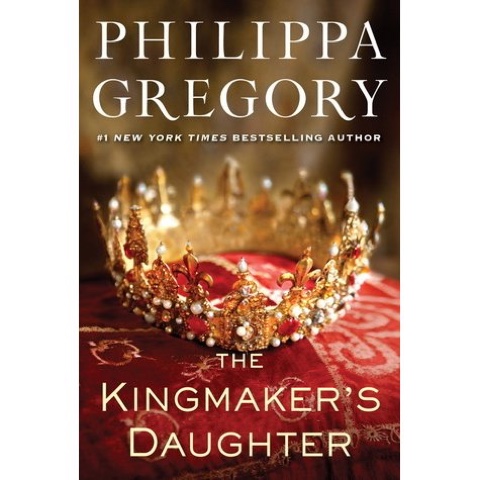The Kingmaker's Daughter
Aside from having my favourite cover in the whole series, The Kingmaker's Daughter provides an alternate interpretation of many of the events in The White Queen, this time told by the young Anne Neville. Despite her opposition to Elizabeth, Anne was a character I liked (perhaps because of the tv show more than the other novel). She was not her daddy's chosen one or the court favourite, and she never expected to be queen, but she was strong and reasonable. Her fight was always quiet and solitary, yet she stood by her sister through all of the hardships that Lord Warwick forced upon them. She was loyal to her family no matter how they treated her. Anne was a pawn in everyone else's game and yet she remained steadfast in her belief that she could be more than the silly girl that others saw her as.
Unfortunately, I'm not sure this portrayal of her totally did her justice. Yes, she was all of the things I just said. Yet she was also paranoid and easily persuaded, which often caused her to be isolated from everyone else by her own suspicions and fears. Anne spends so much of her life worrying about how Elizabeth might have caused the Nevilles to suffer through a witch's curse that she trusts no one loyal to the Plantagenet king, except his less than faithful brothers. Admittedly, she does fall in love with Richard, but his loyalty was with his brother and not the queen, so Anne knew that he was as upset with their rule as she was.
The worst part of this book, for me, was the constant feeling that Richard did not love Anne. Instead, it seems that he pretends that he is in love so that he can have her inheritance and her family's political influence. It makes him equal with George and a threat to Edward, cleverly positioning him to take the throne should he ever choose to go against his brothers. Richard, to me, was always the most likeable Plantagenet brother, so this was devestating to read. I tried hard to convince myself that this was one of two interpretations, that Richard might really love her. And it can be read that way, but somehow I continued to pick up on an undertone of deceit. This seems out of place in a book that is written with a focus on Anne, since it would seem more logical to let the skeptics in the book question the marriage while allowing the heroine to find true love. Yet this does not seem to be the case. Perhaps the information that Philippa Gregory was able to dig up on the marriage pointed too strongly at Richard's trickery for the author to ignore this very real possibility.
In spite of everything that happened, all of the betrayal and loss that Anne faced even from an early age, she remained strong and believed in herself, and she was finally able to become queen, just as her father had hoped.
This book does a good job of telling the story of Anne Neville while allowing for different interpretations of events in her life, so that readers can fully understand the history surrounding this (perhaps) lesser-known queen. What was her relationship with Richard? Did he love her? Did he love princess Lizzie? Did Elizabeth curse their family (however unlikely that seems)? And most importantly, what happened to the boys in the tower? The fact that these questions are never answered makes the book that much more interesting, and how one chooses to answer these questions influences how one views the characters involved.


Comments
Post a Comment